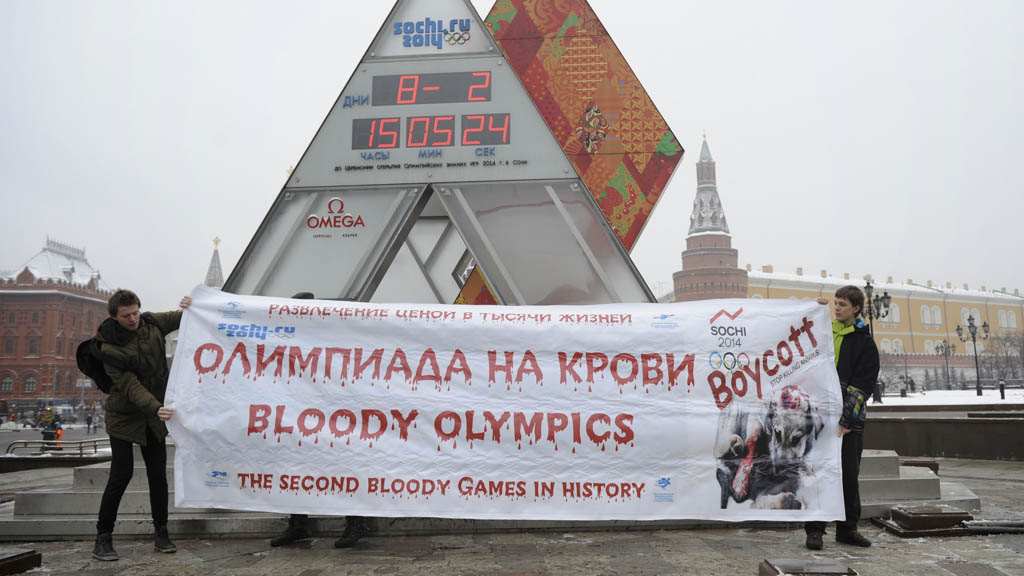Sochi 2014 arrests: from gay rights to Pussy Riot
As two members of punk band Pussy Riot are detained in Sochi, Channel 4 News looks at Russia’s Winter Olympics protest arrests so far.
Maria Alyokhina and Nadezhda Tolokonnikova, two members of the protest band, said they were detained by the Russian authorities on Tuesday on suspicion of theft.
Both women said on Twitter that police had used force to throw them into a van, and that they were being questioned without lawyers.
The pair said they were in Sochi to record a song called “Putin will teach you to love the motherland” – a song dedicated to, among other things, the “corrupt Olympics” and “suppressed freedoms in Russia”.
Ð?аÑ?а ÐлеÑ?ина, Ñ Ð¸ еÑ?е одна Ñ?Ñ?аÑÑ?ниÑ?а Pussy Riot едем в оÑ?дел полиÑ?ии Ð?линово за наÑ?ождение в СоÑ?и. pic.twitter.com/bj8qpX7gMN
— ÐÐ°Ð´Ñ Ð¢Ð¾Ð»Ð¾ÐºÐ½Ð¾ (@tolokno) February 18, 2014
(Above: translation – Masha Alyokhina, myself and one other member of Pussy Riot going to the Blinovo police department in Sochi.)
Ms Tolokonnikova said on Twitter that when the pair were arrested they were not carrying out any protests. “We walked through Sochi. WALKED”, she wrote.
The pair were later released by police, and said they had been questioned in relation to a theft at their hotel.
The arrests come two months after the pair were released from prison under an amnesty. They had served a year and a half in prison for protesting in Moscow’s Cathedral of Christ the Saviour.
However, these are not the only detentions durign the Winter Olympics as the global spotlight falls on Putin’s Russia.
Vladimir Luxuria
Former member of the Italian parliament and a prominent LGBT rights campaigner Vladimir Luxuria was detained by police after reportedly shouting “it’s okay to be gay” in the Sochi Olympic park.
It was reported that Ms Luxuria was prevented from entering the Shayba arena on Monday night, where ice hockey is being held, and was taken away in a police car.
On Twitter Ms Luxuria had earlier said she was detained by police who said she should not wear clothes with slogans supporting gay rights on them. The police have denied detaining her.
Environmental protest
David Khakim, an environmentalist protester, was arrested by police in Sochi after waving a banner saying “Freedom for Yevgeny Vitishko”.
Mr Vitishko is an environmental campaigner who, on 13 February, had his three-year sentence upheld by a court in Krasnodar on charges of damaging the regional governor’s property. Mr Vitishko had painted the word “thief” on the regional governor’s residence.
He had originally received a suspended sentence in 2012, but was detained in early February for allegedly swearing at police. Critics say the police were using their powers to silence a man who had protested against the environmental impact of the Sochi games.
Animal rights
A Russian animal rights activist, protesting against the killing of stray dogs in Sochi in the run up to the Winter Olympics, was reportedly arrested the day after the event’s opening ceremony.

The protester was said to have been arrested after, along with two other demonstrators, he held up a banner depicting a puppy covered in blood. The banner read “Bloody Olympics.”
Two protesters fled when a police officer approached, and the man was arrested. Following an outcry and allegations that stray dogs were being killed in Sochi, local authorities have built makeshift dog shelters.
Moscow and St Petersburg arrests
On the first day of the Sochi games four gay rights protesters, including one pregnant woman, were arrested in St Petersburg.
Campaign group All Out said the group were arrested for holding a banner that said: “Discrimination is incompatible with the Olympic Movements. Principle Six. Olympic Charter.”
Principle Six of the Olympic charter reads: “Any form of discrimination with regard to a country or a person on grounds of race, religion, politics, gender or otherwise is incompatible with belonging to the Olympic movement.”
On the same day, ten protesters were arrested in Moscow’s Red Square, allegedly for singing the national anthem whilst waving rainbow flags.
Protesters were released after a few hours, though one activists said the group had been insulted by the police, and that one officer spat in a demonstrator’s face.
Moscow police declined to comment.
-
Latest news
-
Debate: how should the arts be funded as Israel funding boycotts grow?7m

-
Operation Black Vote: quarter of BAME adults not registered to vote in UK4m

-
Home Secretary demands explanation after Surrey Police ram cow with vehicle4m

-
Princess Kate makes first public appearance since cancer diagnosis2m

-
Labour rules out capital gains tax on sale of homes | Election ‘243m

-




